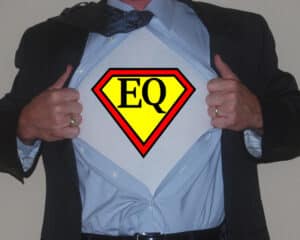
It’s been 20 years since Daniel Goldman’s book “Emotional Intelligence” was published, and interest in the subject doesn’t seem to be losing steam. There are volumes of research that link social and emotional abilities to personal success and seemingly countless self-help books on improving your EQ. A recent unscientific consultation with The Google quickly returned about 14 million hits on the subject.
Not to sound blasphemous, but emotional intelligence is just not that complicated. Most people have more EQ than they give themselves credit for. In fact, I’ve only met two people with really low emotional intelligence: my teenage daughter’s boyfriend and a senior government executive whose entire Johari Window is a blind spot.
Using sophisticated words to describe your EQ may make you sound sagacious at the office cocktail party, but measuring your EQ matters much less than ensuring you’re using your abilities for good and not for evil…kind of like a super power.
If the answers to any of these questions ring a bell, you probably have a higher EQ than you think:
Is it important to be aware of your emotional state and how it influences interpersonal and group dynamics? Absolutely. Can I always control my emotional response because I know what pushes my buttons? Nope.
Does being able to recognize another person’s emotional state help you respond in a way that de-escalates the situation and yields a more positive outcome? Certainly. Do I occasionally pass on the opportunity to de-escalate just for the entertainment of watching a jerk lose his mind? Yep.
Can showing empathy to a frustrated co-worker turn things around and bring them back off the ledge? Almost always. Do I occasionally poke the badger because I’m tired of the whining? Guilty.
See – you don’t need to know your EQ score or any fancy EQ vernacular to know whether a response to a given situation is going to make it better or worse. However, if you want to experience the professional success that research shows comes with more developed social and emotional abilities, you have to intentionally choose to use your EQ for good.
Look at it this way: If you’re forever finding yourself in emotionally charged or awkward exchanges, you’re either doing it on purpose, or you’re too self-absorbed to realize what’s happening until it’s too late. Either way, it’s YOU. Like my oldest daughter told me the other day, “if everything around you smells like $#!+, you should probably check your shoe.” If you’re doing it on purpose, that’s using your EQ for evil – stop it! Assuming it’s the latter, a little EQ boost is easier than you think.
Begin with some healthy introspection about your interactions with others and how you view your co-workers. Start appreciating what your teammates are contributing, and treat them like human beings that have good days and bad days. Look for the good in others (instead of expecting the worst), and don’t just help others because of what they can contribute to your cause but because helping others is what we’re on the Earth for.
Good leadership creates an environment where using EQ for good comes naturally. It creates a “we” organization with people who have a shared sense of purpose. It develops people who know how to effectively communicate healthy disagreement without the emotional escalation that stems from a lack of trust. It builds a culture where feedback isn’t a dirty word, and it creates teams that know success isn’t hiding behind a thin veneer of playing nice.
So, you can be content with the EQ you have, or you can read the books, attend training seminars, and take as many self-assessments (notoriously unreliable for those with low EQ) as you can stand to measure your EQ improvement. Just know that regardless of how emotionally intelligent you are, if you’re not using your “super power” for good, your organization is better off without you.
How are you using your EQ?
It’s up to you.

